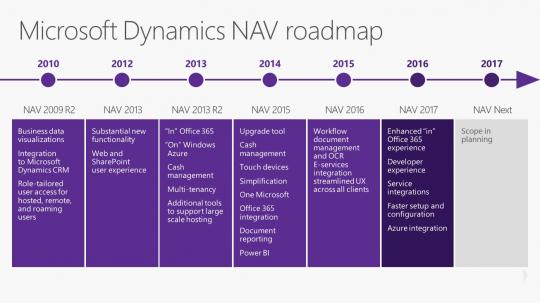Debate on Extensions Grows: Microsoft Dynamics NAV Professionals Weigh the Impact

Microsoft Dynamics NAV roadmap, July 2016
Microsoft is preparing two new product releases related to Dynamics NAV in late 2016: NAV 2017 and the Financials portion of Dynamics 365 for Business (that's the SMB option, currently in preview as Project Madeira). The two products will offer similar financial management capabilities, based on core NAV, but they will also differ in many ways, from pricing and licensing to deployment options to depth of functionality.
NAV 2017 and Dynamics 365 Business Financials will also share another important detail: their support for the extensions framework. For Dynamics 365, which is a pure SaaS offering, extensions will be the only way to add custom capabilities. But for NAV 2017, which carries forward legacy customization options, the growing focus on extensions is shaking up the partner ecosystem as the community debates the business and technical implications, as well as what the shift in focus will mean for the product's future competiveness.
Extensions are "the current hot topic/disagreement in the NAV world," says James Crowter, a Microsoft MVP and managing director of Technology Management, a UK-based Microsoft partner (who answered questions for MSDW via email). In a recent blog post, he explored reasons why extensions mark a turning point in NAV's history, including how they will move the product past its legacy licensing model that has hobbled the product, its partners, and its customers in recent years.
Partners get familiar extensions
As we reported in May
FREE Membership Required to View Full Content:
Joining MSDynamicsWorld.com gives you free, unlimited access to news, analysis, white papers, case studies, product brochures, and more. You can also receive periodic email newsletters with the latest relevant articles and content updates.
Learn more about us here